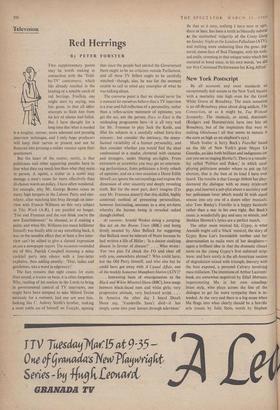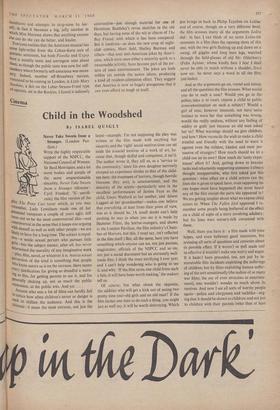New York Postscript
, By all accounts and most standards an exceptionally dull season in the New York theatre with a mortality rate high even for the Great White Grave of Broadway. The main sensation is an off-Broadway piece about drug addicts, The Connection, or as it might be, Tea Without Sympathy. The musicals, as usual, dominate. (Rodgers and Hammerstein have two hits on Broadway, but of the inspiration that went to making Oklahoma 1 all that seems to remain is the corn as high as an elephant's eye.) Much livelier is Jerry Bock's Fiorellol based on the life of New York's great Mayor La Guardia, an idea both brilliant and indigenous (or can you see us staging Herbie?). There is a rounde- lay called 'Politics and Poker,' in which card- playing politicians ponder whom to put up for election, that is the best of its kind I have ever heard. The trouble is that George Abbott has play- doctored the dialogue with so many irrelevant gags, and inserted a sub-plot about a secretary and her policeman lover which would fit with equal unease into any one of a dozen other musicals; also Tom Bosley's Fiorello is a happy facsimile rather than a star in his own right. But Bock's music is wonderfully gay and easy to whistle, and Sheldon Hornick's lyrics are a perfect match.
The other main musical hit, Gypsy, is what Anouilh might call a 'black' musical, the story of Gypsy Rose Lee's formidable mother and her determination to make stars of her daughters— again a brilliant idea in that the dramatic climax turns on the young Gypsy's first enforced strip- tease, and here surely is the all-American version of degradation mixed with triumph, bravery with the bust exposed, a personal Calvary involving mass titillation. The intentions of Arthur Laurents' book are somewhat negatived by Ethel Merman. impersonating Ma in her own sounding- brass style, who plays across the line of the dialogue to get far more sympathy than is in- tended. At the very end there is a big scene when Ma flings into what clearly should be a horrific aria (music by Julie Stein, words by Stephen Sendheirm and attempts to strip-tease by her- self; in fact it becomes a big, jolly number in which Miss Merman shows that anything anyone else can do she can do better, and louder. Everyone realises that the American musical has come light-miles from the Cohan-Kern axis of Patriotic sentiment, but both Fiorello and Gypsy have a notably tonic and astringent note about them, as though the public taste was now for self- mockery where formerly self-assurance was neces- sttrY. Indeed, another off-Broadway success, rumoured to be coming to London, is Little Mary Sunshine, a skit on the Lehar-Strauss-Friml type of operetta, set in the Rockies. 1 found it tediously uninventive—just enough material for one of Hermione Baddeley's revue sketches in the old days, but having none of the wit or charm of The Boy Friend, with which it has been compared. But it confirms—as does the new crop of night- club comics, Mort Sahl, Shelley Burman and others—that sour anti-American jokes by Ameri- cans, which were once either a minority quirk or a treasonable activity, have become part of the pat- tern of mass entertainment. The jokes are both within yet outside the native idiom, producing a kind of resident-alienation effect. They suggest that America is now so hugely prosperous that it can even afford to laugh at itself.











































 Previous page
Previous page